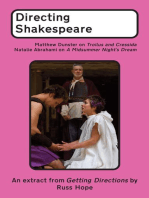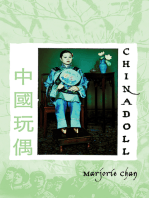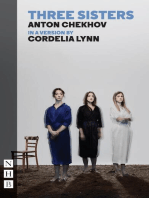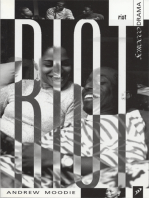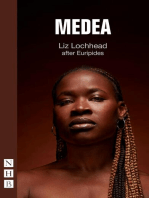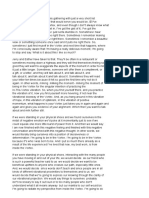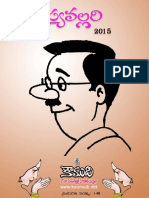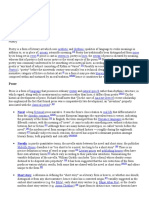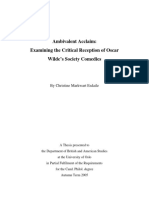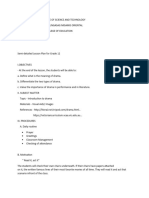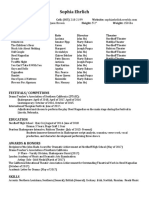0 ratings0% found this document useful (0 votes)
248 viewsModern Drama
Modern Drama
Uploaded by
Rangothri Sreenivasa SubramanyamThis document provides an overview of modern drama from the late 19th century to the mid 20th century. It outlines several key trends in modern drama including a focus on realism and addressing contemporary social issues (Ibsen, Chekhov), symbolism and psychological themes (Strindberg), socialism and political/economic reform (Shaw), epic theatre that provokes audiences (Brecht), and absurdism that presents the human condition as fundamentally absurd (Beckett). The document also summarizes some of the most famous plays and playwrights from different regions that helped establish modern drama as a means of insight and communal experience.
Copyright:
Attribution Non-Commercial (BY-NC)
Available Formats
Download as PPT, PDF, TXT or read online from Scribd
Modern Drama
Modern Drama
Uploaded by
Rangothri Sreenivasa Subramanyam0 ratings0% found this document useful (0 votes)
248 views15 pagesThis document provides an overview of modern drama from the late 19th century to the mid 20th century. It outlines several key trends in modern drama including a focus on realism and addressing contemporary social issues (Ibsen, Chekhov), symbolism and psychological themes (Strindberg), socialism and political/economic reform (Shaw), epic theatre that provokes audiences (Brecht), and absurdism that presents the human condition as fundamentally absurd (Beckett). The document also summarizes some of the most famous plays and playwrights from different regions that helped establish modern drama as a means of insight and communal experience.
Original Description:
English Modern Drama
Copyright
© Attribution Non-Commercial (BY-NC)
Available Formats
PPT, PDF, TXT or read online from Scribd
Share this document
Did you find this document useful?
Is this content inappropriate?
This document provides an overview of modern drama from the late 19th century to the mid 20th century. It outlines several key trends in modern drama including a focus on realism and addressing contemporary social issues (Ibsen, Chekhov), symbolism and psychological themes (Strindberg), socialism and political/economic reform (Shaw), epic theatre that provokes audiences (Brecht), and absurdism that presents the human condition as fundamentally absurd (Beckett). The document also summarizes some of the most famous plays and playwrights from different regions that helped establish modern drama as a means of insight and communal experience.
Copyright:
Attribution Non-Commercial (BY-NC)
Available Formats
Download as PPT, PDF, TXT or read online from Scribd
Download as ppt, pdf, or txt
0 ratings0% found this document useful (0 votes)
248 views15 pagesModern Drama
Modern Drama
Uploaded by
Rangothri Sreenivasa SubramanyamThis document provides an overview of modern drama from the late 19th century to the mid 20th century. It outlines several key trends in modern drama including a focus on realism and addressing contemporary social issues (Ibsen, Chekhov), symbolism and psychological themes (Strindberg), socialism and political/economic reform (Shaw), epic theatre that provokes audiences (Brecht), and absurdism that presents the human condition as fundamentally absurd (Beckett). The document also summarizes some of the most famous plays and playwrights from different regions that helped establish modern drama as a means of insight and communal experience.
Copyright:
Attribution Non-Commercial (BY-NC)
Available Formats
Download as PPT, PDF, TXT or read online from Scribd
Download as ppt, pdf, or txt
You are on page 1of 15
Modern Drama
An Intro for ENG4U
Modern Drama: Setting the Stage
Desire for Political, Social, and Economic Reform Growth of Nationalism and Imperialism Growth of Pragmatism
Modern Drama: Setting the Stage
Charles Darwin (1809-1882) Origin of Species (1859)
Modern Drama: Setting the Stage
Eugene Scribe (17911861) The well-made play Cause-to-Effect arrangement of incidents
Modern Drama: Opening Night
Henrik Ibsens Realism (1828-1906)
Norwegian playwright who established the foundations of "realistic" drama, writing in prose and dealing with contemporary social problems, morality, and social institutions. Art should be a source of insights, a creator of discussion, a conveyor of ideassomething more than entertainment. Among his most famous plays are those we now call classics: A Doll's House (1879), Ghosts (1881), The Wild Duck (1884), Hedda Gabler (1890), and The Master Builder (1892)
Modern Drama: Early Run
August Strindbergs Symbolism (1849-1912)
Swedish playwright dealing with forms of psychological and sexual strife between men and women often through a reaction in favour of spirituality, the imagination, and dreams. Among his plays are many we now call classics: Miss Julie (1888), The Creditors (1889), A Dream Play (1902), The Ghost Sonata (1907)
Modern Drama: Russian Tour
Anton Chekhovs Psychological Realism (1860-1904)
Russian playwright known for the psychological realism of his plays and for their commentary on prevailing social conditions. Some of his plays which we now consider classics: The Seagull (1896), Uncle Vanya (1899), The Three Sisters (1901), and The Cherry Orchard (1904)
Modern Drama: Across the Channel
George Bernard Shaws Socialism (1856-1950)
A socialist, who founded the Fabian Society, his plays were committed to exploring the social fabric of his contemporary culture - class structure, religion, economic and political reform, the status of women, and trade unionism are among the issues his plays tackled. Some of his plays which we now consider classics include: Mrs. Warren's Profession (1893), Man and Superman (1903),Major Barbara (1905), Pygmalion (1913), and Saint Joan (1923)
Modern Drama: German Expression
Bertolt Brechts Epic Theatre (1898-1956)
Epic theatre is intended to provoke spectators into a heightened social and political awareness rather than involve them emotionally in a realistic or naturalistic situation. Brecht didn't want spectators to sympathize with his characters, so his plays deliberately seek to alienate audience from play and actors. Some of his plays are now considered classics: The Threepenny Opera (1928), Mother Courage and Her Children (1939), The Good Woman of Setzuan (1943), and The Caucasian Circle (1945)
Modern Drama: French Surrealism
Antonin Artauds Cruelty (1896-1948)
Artaud expressed his admiration for Eastern forms of theatre, particularly the Balinese. He admired Eastern theatre because of the codified, highly ritualized physicality of Balinese dance performance, and advocated what he called a "Theatre of Cruelty". By cruelty, he meant not sadism or causing pain, but rather a violent, physical determination to shatter the false reality which, he said, lies like a shroud over our perceptions.
Modern Drama: Italian Grotesque
Luigi Pirandellos Subjectivity (1867-1936)
Pirandellos plays usually turn upon a question of fact that cannot be resolved because each character has his own version of the truth. Thus, Pirandello raises doubts about the validity of the scientific approach to truth the direct observation of reality. He seems to suggest that truth is necessarily personal and subjective. Plays include: Right You AreIf You Think You Are (1916), Six Characters in Search of an Author (1921), Henry IV (1922), Naked (1922), and Each in His Own Way (1924).
Modern Drama: Spanish Generation
Garcia Lorcas Imagery (1898-1936)
Blending poetic imagery with primitive passions and themes of love and honor. Plays include: Blood Wedding (1933), Yerma (1934), and The House of Bernarda Alba (1935)
Modern Drama: American Ambassador
Eugene ONeill (1888-1953)
More than any other dramatist, O'Neill introduced the dramatic realism pioneered by Anton Chekhov, Henrik Ibsen, and August Strindberg into American drama, and was the first to use truly American vernacular in his speeches. His plays involve characters who inhabit the fringes of society, where they struggle to maintain their hopes and aspirations but ultimately slide into disillusionment and despair. Plays include: The Hairy Ape (1922), Desire Under the Elms (1924), The Iceman Cometh (1939), and Long Days Journey Into Night (1941)
Modern Drama: Post-War Existentialism
Samuel Becketts Absurdity (1906-1989)
Theatre of the Absurd presents the human condition as fundamentally absurd - not open to understanding or knowledge on the part of humans, life is simply lived, acknowledging the inherent absurdity of existence. Beckett's plays feature illogical and purposeless activity in place of plot; dialogue that presents endless contradictions between language and action; a bare stage that defied conventional ideas about spectacle and special lighting or other effects. Beckett's purpose was to discover the limits of drama and to challenge audiences to move away from their comfortable complacent roles as spectators in the theatre. Plays include: Waiting for Godot (1952), Endgame (1957), Happy Days (1960)
Modern Drama: Common Trends
A Unified Production A Strong Director/Vision informing all elements Artistic Integrity: Theatre as a source of insight and inquiry and a place of communal gathering (tied to Greek roots)
You might also like
- Six Characters in Search of an Author: Full Text and Introduction (NHB Drama Classics)From EverandSix Characters in Search of an Author: Full Text and Introduction (NHB Drama Classics)No ratings yet
- Directing Shakespeare: Matthew Dunster on Troilus and Cressida; Natalie Abrahami on A Midsummer Night's DreamFrom EverandDirecting Shakespeare: Matthew Dunster on Troilus and Cressida; Natalie Abrahami on A Midsummer Night's DreamNo ratings yet
- Metamorphosis (NHB Modern Plays): (stage version)From EverandMetamorphosis (NHB Modern Plays): (stage version)Rating: 4 out of 5 stars4/5 (1780)
- No White Picket Fence: A Verbatim Play about Young Women’s Resilience through Foster CareFrom EverandNo White Picket Fence: A Verbatim Play about Young Women’s Resilience through Foster CareNo ratings yet
- Directing Tennessee Williams: Joe Hill-Gibbins on The Glass MenagerieFrom EverandDirecting Tennessee Williams: Joe Hill-Gibbins on The Glass MenagerieNo ratings yet
- LineStorm Playwrights Present Go Play Outside: Twenty-Five Short Plays Written for the Great OutdoorsFrom EverandLineStorm Playwrights Present Go Play Outside: Twenty-Five Short Plays Written for the Great OutdoorsLolly WardNo ratings yet
- A Decade of Theatre for Seniors: a Journey of Aesthetics and Innovation in Later LifeFrom EverandA Decade of Theatre for Seniors: a Journey of Aesthetics and Innovation in Later LifeNo ratings yet
- A Fine Fiasco: Two Commedia dell'Arte Plays for the Modern StageFrom EverandA Fine Fiasco: Two Commedia dell'Arte Plays for the Modern StageNo ratings yet
- John Gabriel Borkman (NHB Classic Plays): (Bridge Theatre version)From EverandJohn Gabriel Borkman (NHB Classic Plays): (Bridge Theatre version)Rating: 4 out of 5 stars4/5 (17)
- Medea (NHB Classic Plays): (National Theatre of Scotland version)From EverandMedea (NHB Classic Plays): (National Theatre of Scotland version)No ratings yet
- 20th Century Modern DramaDocument7 pages20th Century Modern Dramamisbahj098No ratings yet
- Unit V Reading Comprehension FinalDocument14 pagesUnit V Reading Comprehension FinalRangothri Sreenivasa SubramanyamNo ratings yet
- RS Unit VI Paragraph Writing FinalDocument7 pagesRS Unit VI Paragraph Writing FinalRangothri Sreenivasa SubramanyamNo ratings yet
- Unit VI RS Letter Writing FinalDocument26 pagesUnit VI RS Letter Writing FinalRangothri Sreenivasa Subramanyam100% (1)
- Ahankaar - Mimansha in HindiDocument243 pagesAhankaar - Mimansha in HindiRangothri Sreenivasa SubramanyamNo ratings yet
- Kundalini Breathing ExerciseDocument2 pagesKundalini Breathing ExerciseAbdRdr63100% (4)
- Abraham Hicks QuotesDocument10 pagesAbraham Hicks QuotesKeyaraMalika100% (2)
- Gita For AwakeningDocument300 pagesGita For AwakeningLokesh KhuranaNo ratings yet
- The Directors - Take FourDocument241 pagesThe Directors - Take FourBogdan Theodor Olteanu100% (1)
- Adjective Clauses Review Ex Answer KeyDocument5 pagesAdjective Clauses Review Ex Answer KeyRangothri Sreenivasa SubramanyamNo ratings yet
- Activating Vocaulary Through PicturesDocument25 pagesActivating Vocaulary Through PicturesRangothri Sreenivasa SubramanyamNo ratings yet
- Easier English Basic SynonymsDocument129 pagesEasier English Basic SynonymsRangothri Sreenivasa SubramanyamNo ratings yet
- ASHAMASHI (Telugu Kaburulu)Document122 pagesASHAMASHI (Telugu Kaburulu)Rangothri Sreenivasa SubramanyamNo ratings yet
- Koumudi - Sramanakam TeluguDocument152 pagesKoumudi - Sramanakam TeluguRangothri Sreenivasa SubramanyamNo ratings yet
- Gayathri Mantra in TeluguDocument18 pagesGayathri Mantra in Teluguramu0510100% (3)
- KOUMUDI - 2015 - HASYAVALLARI TeluguDocument51 pagesKOUMUDI - 2015 - HASYAVALLARI TeluguRangothri Sreenivasa Subramanyam100% (1)
- Rules of Concord or SubjectDocument3 pagesRules of Concord or SubjectRangothri Sreenivasa Subramanyam33% (3)
- W3 U3 L13.Controlling Negative Emotions Managing AngerDocument13 pagesW3 U3 L13.Controlling Negative Emotions Managing AngerRangothri Sreenivasa SubramanyamNo ratings yet
- W3 U2 L12.Assertiveness 3 How To Say NoDocument11 pagesW3 U2 L12.Assertiveness 3 How To Say NoRangothri Sreenivasa Subramanyam100% (1)
- PlaywrightDocument4 pagesPlaywrightGiorgio MattaNo ratings yet
- Elizabethan Drama + Analysis of MacbethDocument14 pagesElizabethan Drama + Analysis of MacbethsalaouatchimayssaNo ratings yet
- Lesson 1: Introduction To LiteratureDocument8 pagesLesson 1: Introduction To Literaturereen leighNo ratings yet
- Sofija Todić, Ibsen's Piano, Oslo 2010Document103 pagesSofija Todić, Ibsen's Piano, Oslo 2010sofijatodicNo ratings yet
- Shaw-A Social ReformerDocument2 pagesShaw-A Social ReformerAbdulRehman100% (5)
- Saras ProjectDocument35 pagesSaras ProjectDonet M ThomasNo ratings yet
- 20 Words We Owe To William ShakespeareDocument4 pages20 Words We Owe To William ShakespeareBuşatovici LucicaNo ratings yet
- Block 1Document29 pagesBlock 121BEN029 Preetha SNo ratings yet
- Double Joy ProposalDocument19 pagesDouble Joy ProposalAnonymous 0S5Dqq0Em6No ratings yet
- Drama Thesis StatementDocument7 pagesDrama Thesis StatementAlicia Edwards100% (1)
- Kislan - The Score PDFDocument12 pagesKislan - The Score PDFKatelyn DietzNo ratings yet
- Major Forms of LiteratureDocument2 pagesMajor Forms of LiteratureJohari Valiao Ali50% (2)
- Greek Tragedy As A Genre: Form of The Greek Tragic Genre To Create Dramatic Sequences ThatDocument13 pagesGreek Tragedy As A Genre: Form of The Greek Tragic Genre To Create Dramatic Sequences ThatAlthea DaniseNo ratings yet
- Text Types and Different Styles of WritingDocument10 pagesText Types and Different Styles of WritingRochelle PrieteNo ratings yet
- Part 3 Artist and His MediumDocument62 pagesPart 3 Artist and His MediumyhannypalmariaNo ratings yet
- Eastern Theatrical TraditionsDocument1 pageEastern Theatrical TraditionsRocío Cubas CelisNo ratings yet
- Eng Q3 - Hiraya G9Document2 pagesEng Q3 - Hiraya G9keziaacubNo ratings yet
- Master ThesisDocument117 pagesMaster ThesisJuhas Diaz100% (2)
- Analysis Characters Waiting For GodotDocument9 pagesAnalysis Characters Waiting For GodotEka OktaviantiNo ratings yet
- International Journal of Applied Linguistics & English LiteratureDocument4 pagesInternational Journal of Applied Linguistics & English LiteratureLallithakumari MNo ratings yet
- Creative Arts GR 8 END Year Examination Booklet 2023Document12 pagesCreative Arts GR 8 END Year Examination Booklet 2023halatitshisikule80% (5)
- Drama NotesDocument44 pagesDrama NotescheptorusvildaNo ratings yet
- Te DeumDocument18 pagesTe DeumDiana Alvarez50% (2)
- Types of Literature: HumanismDocument5 pagesTypes of Literature: Humanismsymba leiNo ratings yet
- Justina Ercole Performing ResumeDocument1 pageJustina Ercole Performing Resumetinydancer5No ratings yet
- Art AppDocument4 pagesArt AppMiko de GuzmanNo ratings yet
- Clydes PlaybillDocument21 pagesClydes PlaybillAustin CarlsonNo ratings yet
- Demo Lesson Plan NelehDocument3 pagesDemo Lesson Plan Nelehnelehquizon48No ratings yet
- Acting ResumeDocument1 pageActing Resumeapi-388529974No ratings yet
- Creative Writing Learners Packet Melc No.1Document5 pagesCreative Writing Learners Packet Melc No.1Glen Welle SuarezNo ratings yet









